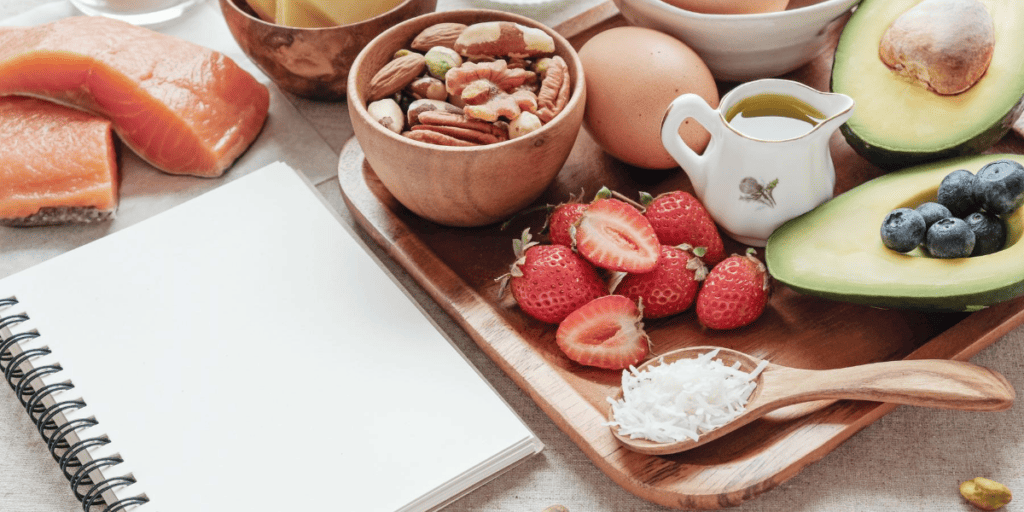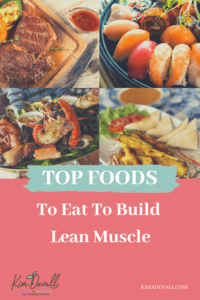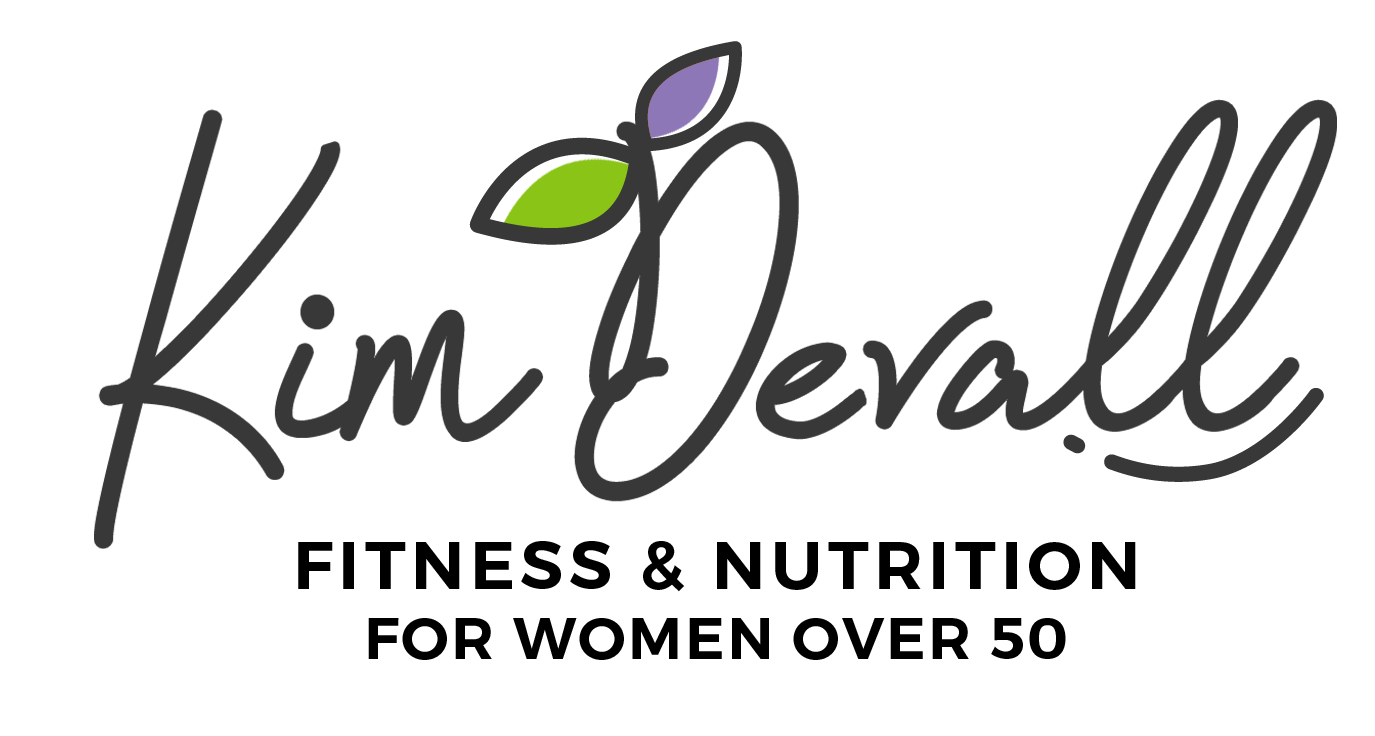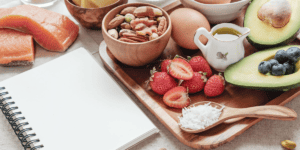- Post author:Kim Devall
- Post published:August 9, 2020
- Post comments:4 Comments

In this blog, I’m sharing what foods you need to eat to get the most benefit out of your strength training routine.
Knowing the top foods to eat to build lean muscle is key. No-one wants to waste time exercising and NOT seeing results.
- 5 Reasons you want to start counting macros today
- 8 reasons you should stop dieting to lose weight
- Use this time to create your at-home fitness routine
- Picky eaters guide to eating healthier
- Top 5 Grocery Store Protein Bars
- 5 Reasons you want to start increasing your physical activity today
- Top 10 Reasons to start tracking the food you eat
- The Scary Truth about Dehydration
- Effective steps to reverse the creeping weight gain
Why is nutrition important to build lean muscle?
What you need to know about Nutrition to build lean muscle.
I won’t spend a lot of time on this, but I think it’s important to have some basic nutrition knowledge as a foundation.
Protein, Carbohydrates and Fats are the backbone of nutrition. You’ll also hear them called “macros” or macronutrirents. These are nutrients that we need in large quanities in order for our bodies to function at their peak. AND, we need all 3!
For more info on macronutrients and the importance of tracking them if your goal is to lose weight, check out this blog.
General guidelines for each macronutrient as a percentage of total calories are:
- Protein 10 – 35%
- Carbs 45 – 65%
- Fats – 20 – 35%
For more information about how to create a simple meal plan using macros and more protein, carb and fat recommendations, grab my Step by Step Guide to Meal Planning with Macros.
High protein foods to build lean muscle
1. Chicken breast
Chicken is one of my absolute favorite proteins. It is loaded with protein. A 3-ounce serving has approximately 26 grams of protein and 140 calories.
2. Eggs
Another one of my daily staples. We all think of eggs for breakfast, but I also love them for a quick dinner when I’m short on time.
A serving of eggs would be either 2 whole eggs or 8 egg whites. Pesonally, I like to have 1 whole egg and 4 egg whites. This is approx 135 calories and 22 grams of protein.
3. Wild Salmon
For some, salmon may be acquired taste. Others love it.
Salmon is an excellent source of protein as well as omega-3 fatty acids.
One thing to keep in mind when you’re shopping for salmon- not all salmon is created equal.
The best choice for salmon is wild. Shop carefully as most salmon in the grocery store is farm-raised. Wild is also more expensive, but worth the extra money (in my opinion).
4. Greek Yogurt
Greek yogurt is a fantastic high-protein food. A couple things to keep in mind:
- not all yogurt provides the same nutritional values
- check nutrition lables specifically for protein and sugar
- regular yogurt will be much lower in protein than greek yogurt
- sugar content will vary significantly
5. Lean Beef
Beef often gets a bad wrap, but that doesn’t mean you can never eat beef again.
The question to ask is “how lean is the beef you are eating?”
For example, a 70% lean ground beef delivers 28g of fat; whereas, a 95% lean ground beef has approximately 5 grams.
AND, more fat also means more calories.
6. Lean Turkey Breast
Turkey breast is an excellent souce of protein with nearly no fat. Definitely a great option with 25g of protein in a 3 ounce serving.
7. Cottage Cheese
Cottage cheese has a unique texture and that can be a turn-off for some. Personally, I love cottage cheese. It comes in a variety a fat levels – from high fat to fat-free. It really depends on how many calories you can afford. I generally go for fat-free.
The big thing I look at with cottage cheese is sodium. It is higher in sodium than most of the other proteins. Again, it just depends on whether you’re already getting a lot of sodium from the other foods you’re eating or not.
A cup of cottage cheese has approximately 28 grams of protein.
8. Protein Powders
I’m frequently asked if protein powders are necessary. My opinion is no; however, I drink a protein shake every day. For me, it is a convenient and delicious way to get a healthy snack and more protein. Protein powders vary considerably so you really need to check labels and know what you are eating/drinking. You want a high quality protein powder that doesn’t have a lot of fillers.
I also add other foods, like spinach, sweet potato, banana, almond milk, cocoa, to my protein powder. A protein shake does not need to be something you just swig fast to get it done.
For years, I drank protein shakes merely to get the protein I needed, but didn’t necessarily enjoy it. No more. Now it is an afternoon snack I look forward to. Make it a treat you enjoy.
9. Fish
There are a variety of fish to pick from. First, I’d say, pick a fish you like. Tilapia is a great choice, but I also like flounder and cod. Fish is a lower calorie protein, but packed with protein. A 3-ounce serving of Tilapia has 21 grams of protein.
How much protein do you need to build lean muscle?
This is a balance between getting 10 – 35% of your calories from protein and approx 1g per pound of body weight. It also depends on how hard and how often your’re exercising. By looking at these two metrics, you should be good.
For a 150 pound women who eats 1800 calories per day, and completes intense strength training 4 or more times a week, her recommended protein would be:
- based on macros would be approximately (10 – 35%) – 45 – 158 grams
- based on her weight, her protein would be approx 150
If building muscle is your goal, you’ll want to be on the higher side of the 10 – 35% range.
Complex carbs to build lean muscle
So, why exactly do you need to eat carbs to build lean muscle? Carbs are the primary source of energy and when you are following a strength training program, your muscles need energy.
If you aren’t eating carbs, then your body is forced to find energy elsewhere – like using protein or breaking down muscle tissue.
You may have noticed I’m saying “complex” carbs. We’ve all heard “carbs are bad”, “don’t eat carbs” etc, right? Well, not all carbs are created equal. We’re going for carbs higher in fiber and low in sugar.
1. Quinoa
2. Brown Rice
Brown rice is another complex carb that provides great energy for your workout. More energy generally means you can workout harder and that means improved strength and more lean muscle mass. 1/2 cup of brown rice is about 25 grams of carbs
3. Sweet Potatoes
Sweet potatoes are another great complex carb. It’s best to forego the brown sugar and butter. I like to sprinkle cinnamon on my sweet potatoes. 1/2 cup of sweet potatoes is about 14 grams of carbs.
4. Oats
Oats are a staple in my diet. I eat oatmeal every single morning for breakfast (along with my eggs). Oats are a great energy source to start the day. A cup of cooked oats has approx 27 grams of carbs.
5. Blueberries
Blueberries are one of those “superfoods” that offer so many nutritional benefits. They are packed with antioxidants and potassium. Not only can they reduce your risk of heart disease and cancer, but they are also anti-inflammatory.
6. Bananas
I love bananas. Did you know that 1/2 a banana is 1 serving? Bananas also make your protein smoothy extra smooth and creamy. And you only need 1/2 banana to do the trick. Bananas are loaded in vitamins and an excellent source of energy.
7. Vegetables
I’ve yet to meet anyone who over eats on veggies. Veggies are an excellent complex carb loaded with tons of vitamins and minerals. My favorites are:
- Spinach
- Broccoli
- Bell Peppers
- Green Beans
- Asparagus
Fill your plate with colorful veggies and Enjoy!
Healthy Fats to build lean muscle
So, why are healthy fats needed to build muscle?
Fat is a source of energy which you definitely need when you’re incorporating a strength training routine.
It’s also important you don’t eat too much healthy fat. Fats provide twice the calories of protein and carbs so those calories can add up fast.
This one of those “a little goes a long way” moments to keep in mind.
1. Almonds
2. Extra-virgin olive oil
3. Avocado
4. Walnuts
5. Fatty Fish
Are there foods to avoid when building lean muscle?
This probably won’t come as a big surprise. If you want the best results meaning you are building lean muscle and you aren’t hiding that muscle under layers of fat, then yes.
With that said, I don’t recommend avoiding your favorite foods to the extent you feel deprived. Once you start feeling deprived, it will be much more difficult to stick to your nutrition plan.
Remember, whether you’re eating to lose weight or to build muslce, everything in moderation.
Here are some of the foods I personally avoid (most of the time):
- alcohol
- excess added sugar
- fast foods
- fried foods
- heavy cream sauces
- processed foods
What if you're a picky eater?
Pulling it all together
- Breakfast: Eggs (either 2 eggs or 1 egg and 4 egg whites), oatmeal. Bonus: add spinach or mushrooms to your eggs.
- AM Snack: Low-fat cottage cheese (or plain greek yogurt) and blueberries (maybe even a small handful of almonds or walnuts)
- Lunch: Grilled chicken, brown rice and broccoli
- PM Snack: Protein shake – chocoloate protein powder, 1c spinach, 1/2 banana ( or 1/2c cooked sweet potato) and almond milk
- Dinner: Wild salmon, quinoa, green beans (or asparagus)
Pin it now. Read it later.


